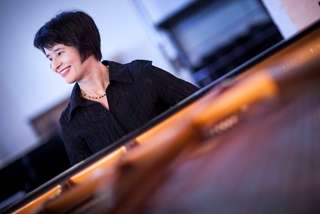|
|
|
Back
In A Fugue State New York
Weill Recital Hall
11/19/2017 -
Johann Sebastian Bach: Die Kunst der Fuge, BWV 1080 (completed by Kimiko Ishizaka)
Kimiko Ishizaka (piano)

K. Ishizaka
“There has been demonstration of the universal truth by fugue, and it may be that more wisdom is to be found in that than in the religions and religious books of all the world together.”
Sacheverell Sitwell
“There’s never been anything more beautiful in all of music.”
Glenn Gould
One of the insoluble problems in music history is whether or not Bach left the conclusion of The Art of Fugue simply unfinished or purposefully incomplete so that it could be resurrected by a new generation of composers and scholars. Clearly former Olympic weightlifter Kimiko Ishizaka subscribes to the theory that there was indeed method to the composer’s madness and has fashioned her own inventive ending with which she graced her performance of the entire piece on Sunday afternoon at the upstairs concert room at Carnegie Hall.
The reader should know that this is not a typical music review. There will be no analysis of individual sections but rather a re-creation of what it is like to be a willing participant in a total immersion musical situation – the whole rather than the sum of its parts. This approach is a reaction to the centuries long debate as to whether Bach was purposefully leaving his composition incomplete or rather that its perceived lack of an ending was really a profound statement about the human condition and its relationship to the deity. After all, even Glenn Gould recorded the piece in an incomplete form, in small sections, and experienced the long hiatuses from the studio as the true meaning of Bach’s spiritual universe. Macro-analysis rather than micromanaging.
Kimiko Ishizaka is a remarkable young woman. She has not only made the effort to master this compendium of fugues but has also tackled the first book of The Well-Tempered Clavier and the Goldberg Variations. She performs these scores without the printed music before her: no page turner and no pages! She shows no fear at these mighty challenges and soldiers on with none but little breaks between variations. All of which emphasizes the anodyne quality of this gigantic work filled with remarkable turns. The experience as a whole is mesmerizing.
Still it must be pointed out that her pianism is still in the formative stage. Trills tended to be sloppy and dynamics undisciplined. Consistency of these dynamics and phrasing within phrases still lack the mature approach. She is a good communicator but as yet only a satisfactory technician. There are twenty separate variations and in some she was spot on, some slow with majestic beginnings, some jaunty, as if a variation on a totally different tune. Perhaps the highlight of this one and one half hours of constant pianism was that they were never boring.
The edition was one by C.P.E. Bach, who taught invaluable lessons to Mozart. In Gödel, Escher, Bach: An Eternal Golden Braid, Douglas Richard Hofstadter takes this holistic approach and follows lines of thought down dark alleys as well as comfortable thoroughfares. After a thought-provoking recital such as this one there is much to ponder. As Carl Dahlhaus cites in his book Nineteenth Century Music:
“...a modern aesthetic which Beethoven held in common with Friedrich Schlegel: the idea that music, not unlike philosophical meditation, represents a train of thought.”
Fred Kirshnit
|
|
|
Copyright ©ConcertoNet.com